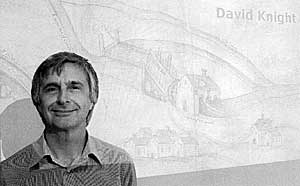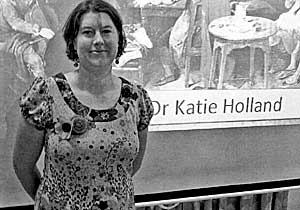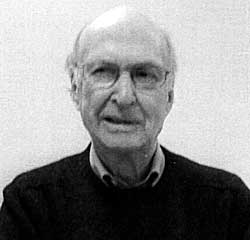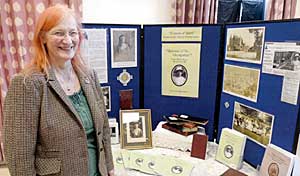Events and excursions, Winter 2010
THE ARCHAEOLOGY LECTURE 9 OCTOBER 2010
Dr David Knight - Understanding Nottinghamshire's Past: priorities for archaeological research.

A packed Nottingham Mechanic's Hall was treated to David Knight, Director of Research at Trent & Peak Archaeology, romping through the past 10000 plus years of Nottinghamshire's past in just under an hour.
David spoke on the Nottinghamshire part of the recently completed research strategy for archaeology in the East Midlands, an English Heritage funded endeavour, building upon the earlier research agenda for the East Midlands and aiming to guide archaeological work in the future by providing a priorities five-year action plan for research.
The strategy provides up to ten research objectives for each archaeological period, derived from wide consultation with regional archaeologists and comparison with national agenda.
By way of example David walked us through the strategy for Nottinghamshire period by period, drawing out such nationally important topics as the presence of Late Upper Paleolithic open sites in the Trent Valley, as attested by work at Farndon near Newark, and the industrial heritage of the exploitation of the Nottinghamshire part of the East Midlands coalfield.
There was also promise of good things to come, such as the much anticipated publication of the excavations in Nottingham undertaken in the 1960s and 70s, which is a research priority and will hopefully be supported by a fresh injection of funds and effort.
The full research strategy will be published in booklet form and on-line, and anticipation of its content provoked lively discussion around the subject of particular research priorities, a crisis in public funding in the wake of government cuts and the potential key role for community archaeology groups in putting the strategy in to action.
Keith Challis
THE NOTTINGHAMSHIRE HISTORY LECTURE 13 NOVEMBER 2010
Dr Katie Holland - Harmony and Good Company: the choir-band as a vehicle of sociability in Nottinghamshire

Katie Holland is well known to many in the local history community, and this excellent lecture was based on work she has recently completed for her Ph.D. thesis.
Choir bands of singers and players were a regular feature of Anglican worship in the eighteenth and nineteenth centuries, and by a meticulous survey of churchwardens' accounts for the East Midlands, Katie has been able to trace a great deal of information about their activities. Farmers, graziers, blacksmiths, wheelwrights, labourers: almost anyone who could play an instrument might be found in a choir band, mostly operating in west galleries, and often doubling up as a social band for weddings and other events outside of church life.
Often, as the lecture showed in some detail, they visited each other, perhaps travelling to an event in a neighbouring village, or doubling up in the west gallery on a Sunday, particularly in the summer months. Katie had found examples from across the county including Bingham, Harworth and Hawkesworth, but she also brought in some of the riches of her research elsewhere in the region, and illustrated the lecture with some excellent pictures. This was a rural culture which had already passed its heyday when the Church of England moved towards organs (harmoniums in the initial stages) and robbed choirs, but the lecture told us a great deal about the willingness and ability of village communities to provide for their own entertainment, and occasionally to enjoy feasts and festivals with their neighbours.
John Beckett
THE NEVILLE HOSKINS LECTURE 11 DECEMBER 2010
Canon Michael Austin - Archdeacon George Wilkins of St. Mary's.

Michael Austin.
Archdeacon Wilkins was Nottingham's equivalent of Anthony Trollope's Archdeacon Grantly of the Barchester novels. Michael Austin referred to him, in Newsletter 61, as 'quite a character', and members who attended the December lecture - now known as the Neville Hoskins lecture in memory of our much loved and respected former president - were not disappointed.
Wilkins was a Church and King Tory, which meant in effect that he was against anything that smacked of change. He was devoted to the maintenance of the Establishment, opposed to anything radical (like the extension of the franchise in 1832 or the building of Roman Catholic churches,
quite apart from Evangelicals and nonconformists), and personally extremely disagreeable. In theory he should have been a very grey character but such were his antics that he came over as remarkably colourful - accused in no less an authority as the Dictionary of National Biography of marrying at Gretna Green! (He was not, but the author of the article was one of many people with a grudge against Wilkins.)
Michael Austin could do little more than pick out aspects of Wilkins's remarkable life story: his pluralism, his brief and rather underwhelming Visitations, his vicious pen when it came to writing tracts, and his frosty, if not arctic, relationship with J.T. Becher, were just some of the vignettes.
If the weather kept you away, some (but not all) of the lecture can be found in Stanley Chapman and Derek Walker, eds., Minster People (Southwell and District Local History Society, 2009: ISBN 978-0-9520503-5-3).
John Beckett
THE NORA WITHAM LECTURE
Dr Rowena Edlin-White - A Spinster of No Occupation

Dr Rowena Edlin-White who gave the Nora Witham Lecture on 8 January 2011, showing her display material at the meeting.
The Society enjoyed this lecture. We were told that one of our members, Myra Chivers, has suggested that Dr. Edlin-White research the life of Myra's great-aunt, Mary Ellen Shaw, in the belief that she was an interesting woman who had devoted her life to the poor of Nottingham and had been unjustly forgotten.
Mary Ellen was the daughter of John Shaw the Registrar of Births and Deaths in the St. Anne's district of Nottingham. In addition to her work as a nursery governess to the children of several families, Mary Ellen assisted her father, and later his successor who was her brother-in-law, in his profession.
She had, rather than being 'of no occupation' worked hard from the age of sixteen, and in addition to paid work became an unpaid social worker in the poorest areas of the City. Dr. Edlin-White described this work and Mary Ellen's teaching at Sunday schools in the local Wesleyan chapel, and said that she devoted her life to alleviating the misery and despair of the urban poor.
The Girls' Home Movement, a Mother and Baby Guild, extensive visiting in prison, workhouse and hospital were all preparation for her greatest achievement, Miss Shaw's Men's Bible Class. Supported by the duchess of Portland in 1900 Mary Ellen took on the problems of hundreds of poor working men in Nottingham and Mansfield.
Our speaker showed examples of Mary Ellen's diaries as a young girl and records from the Men's Bible Class. She also brought copies of her book on Mary Ellen, several copies of which were bought by members after the meeting and were signed by the author.
The lecture was very well received and caused a great deal of discussion afterwards.
Penelope Messenger